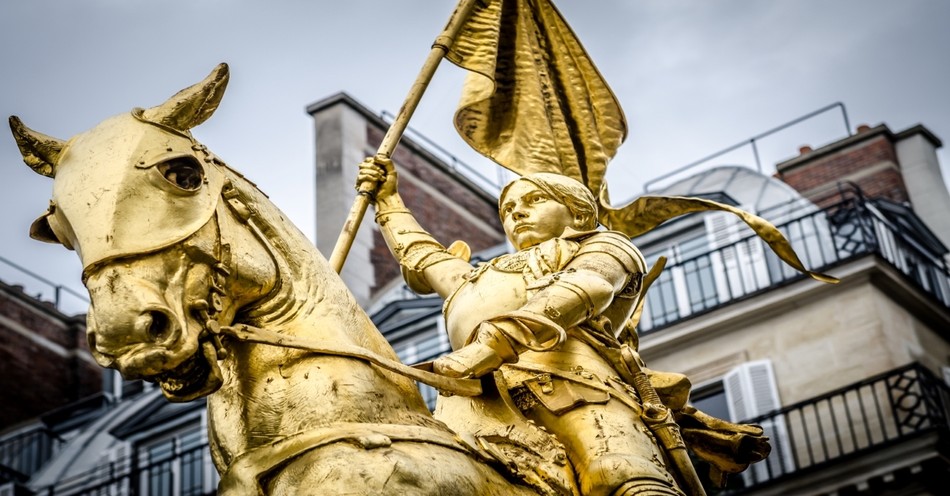Who is St. Joan of Arc? She is a national heroine of France. She lived during the 14th century and was nineteen when she died. Though she was a peasant girl, she believed that Saints were leading her. Her mother had instilled in her a deep love for the Roman Catholic Church.
During this particular period, France had been in conflict with England. Joan of Arc led the French army to a victory at Orleans, which drove back the English’s attempt to conquer France in the 100 Years’ War.
Joan of Arc is known for her courage and firm conviction in her faith. She was also known for her extreme piety. Many people claim that they would die for their faith. Joan was executed for her faith because some people did not believe that God was leading her.
10 Important Events in the Life of Joan of Arc
1. At age 13, Joan of Arc felt that she was being guided by St. Michael, St. Catherine of Alexandria, and St. Margaret of Antioch.
2. In 1428, she traveled from Domre’my to Vaucouleurs. Joan asked the captain of the garrison to join the dauphin, Charles. The dauphin is also known as Charles VII. At the time, the dauphin had been disinherited as the crown prince because of a treaty. The captain did not take Joan seriously, and she traveled back home.
3. Joan of Arc returned in January 1429. Her confidence and conviction in her faith gained her a lot of respect. This time the captain allowed her to go to the dauphin at Chinon.
4. She traveled 11 days to see the dauphin. She had cut her hair and was dressed in men’s clothes. After being in his presence, Joan of Arc convinced Charles that she was a messenger of God and that she would see him crowned king at Reims.
5. Joan asked Charles to give her an army to lead to Orleans, which was under siege by the English. Joan dressed in white armor, rode on a white horse, and led her army to victory over the English.
6. In the Spring 1430, King Charles ordered Joan to confront a Burgundian assault on Compiégne. While fighting, she was thrown from her horse and left outside the town’s gate as the gates closed. The Burgundians took her captive.
7. She had seventy charges against her at her trial, including heresy, witchcraft, and dressing like a man.
8. King Charles did not try to save her. He sought to distance himself from her since she was an accused heretic and labeled a witch.
9. In May 1431, Joan of Arc signed a confession that she had never received divine guidance. They had threatened her with death. Near the end, she switched back to her story of being guided divinely.
10. On May 30, 1431, they burned Joan at the stake in the marketplace of Rouen.
10 Important Quotes by Joan of Arc
Joan of Arc accomplished much in her short life. Many quotes are attributed to her. A generous portion of the quotes listed below come from Joan of Arc: Her Story by Regine Pernoud and Marie-Veronique Clin.
1. “...you shall never hold the Kingdom of France from God, the King of Heaven, the son of St. Mary; but King Charles, the true heir, will hold it; for God, the King of Heaven wishes it so....”—quoted in Pernoud & Clin, p. 34.
2. “You ruin the sacraments of the Church, you rend the articles of Faith, you destroy churches... What rage or madness drives you? This Faith, which Almighty God, which the Son, which the Holy Spirit have revealed, established, given sway and glorified a thousandfold through miracles is the faith which you persecute.... if I do not hear that you have corrected yourselves, I may well leave these English and set off against you, so that, by the sword if I cannot otherwise, I may remove your madness and foul superstition... if you choose instead to return to the Catholic faith and to the original source of light, send me your ambassadors and I shall tell them what you must do.”—quoted in Pernoud & Clin, p. 259.
3. “Children say that people are hanged sometimes for speaking the truth.”—quoted in World Famous Women by Frank Boott Goodrich, p. 126
4. “About Jesus Christ and the Church, I simply know they’re just one thing, and we shouldn’t complicate the matter.”—quoted in The Catechism of the Catholic Church
5. “Alas! that my body, clean and whole, never been corrupted, today must be consumed, and burnt to ashes.”—quoted in Jeanne d’Arc, maid of Orleans, Deliverer of France by T. Douglas Murray
6. “I do not fear men-at-arms; my way has been made plain before me. If there be men-at-arms, my Lord God will make a way for me to go to my Lord Dauphin. For that am I come.”—quoted in The Life of Joan of Arc by Anatole France, translated by Winifred Stevens, vol. I, p. 97 (referencing Trials, vol. I, p. 449).
7. “I would rather die than do something which I know to be a sin, or to be against God’s will.”
8. “One life is all we have, and we live it as we believe in living it. But to sacrifice what you are and to live without belief, that is a fate more terrible than dying.”
9. “You say that you are my judge; I do not know if you are; but take good heed not to judge me ill, because you would put yourself in great peril.”
10. “I was thirteen when I had a Voice from God for my help and guidance.”
10 Things You Probably Did Not Know about Joan of Arc
1. Joan of Arc did not have military training, but she convinced a crown prince to let her lead a French army to the city of Orleans. Here they were victorious over the English.
2. Joan’s faith did not waver in the face of death and being burned at the stake. She asked that a crucifix be placed in front of her. She called on the name of Jesus until she died.
3. Joan of Arc understood that deliverance would come to France through her.
4. After a French victory at Pasay, Joan had to convince Charles to take his rightful place as king. She even knelt before him and called him king.
5. When Joan was captured, they did not allow her any legal counsel.
6. While imprisoned, she had been ordered to put on women’s clothes. She defied this order and put on male attire.
7. Before she was executed, Joan received communion.
8. Pope Calixtus III annulled her sentence in 1455–56.
9. Pope Benedict XV canonized Joan on May 16, 1920. Her feast day is May 30.
10. On June 24, 1920, the French parliament decreed a yearly national festival in her honor on the second Sunday in May.

This article is part of our People of Christianity catalog that features the stories, meaning, and significance of well-known people from the Bible and history. Here are some of the most popular articles for knowing important figures in Christianity:
How Did the Apostle Paul Die?
Who are the Nicolaitans in Revelation?
Who Was Deborah in the Bible?
Who Was Moses in the Bible?
King Solomon's Story in the Bible
Who Was Lot's Wife in the Bible?
Who Was Jezebel in the Bible?
Who Was the Prodigal Son?



.jpg)